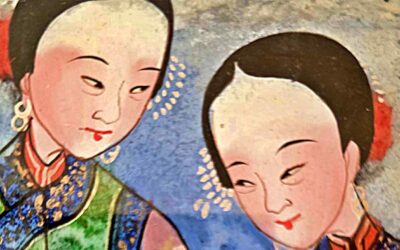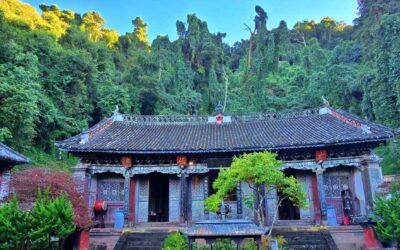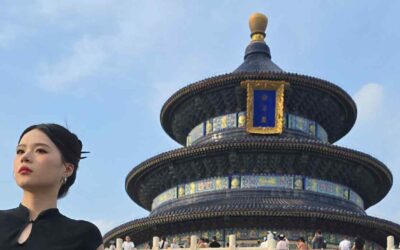Festivals of the Zhuang Nationality
New Year
The most important festival of the Zhuang year. Their celebration is similar to that of the local Chinese, although with some special characteristics. The children play their traditional games. In Wenshan County horse races are held between teams from different villages.
The Festival of The Mother Frog
This festival takes place in the basin of the Hongshui (Red) River. It is a complex ceremony in honor of the frog that announces the coming of the rains, celebrated from the first day of the year until the end of the first month. The main activities are centered, as the name makes obvious, around this frog, worshipped as the daughter of the thunder and therefore, the carrier of rains, who brings them out.
The Festival of Beginning to Sow
This is an old ritual to request good winds and rains to benefit the crops. It is probably a vestige of matriarchal times when women directed the crop cycle.
The Third Month Festival
It takes place on the third day of the third lunar month. Also called the «festival of singing in the fields», it is a party in honor of Third Sister Liu, who, according to tradition, taught the Zhuang people to sing.
This is one of the most interesting festivals of the Zhuang. It is also called «singing in the fields» or the «song outside the caves» (because before, the Zhuang people had their altars in the caves, and only when they were outside they sang).
This festival originates from the Tang dynasty, when Third Sister Liu lived. In fact, the date of this festival is said to coincide with that of her death. But there are many indigenous peoples of southern China that celebrate similar festivities, and perhaps the origin is even older.
Local legends relate that during the Tang dynasty lived a Zhuang girl who sang extraordinarily well. The landlord of this area become fond of her and, seeing that it was impossible to get her of her own good will, sent some people to abduct her. Once he had obtained Third Sister Liu she refused to sing for him. Then he ordered her to be thrown into the river.
Miraculously, she survived. After some time, she married a hunter and went on teaching the Zhuang the art of singing. The news of her new life soon reached the cruel landlord, who intervened once again. He ordered his flunkies to murder both her and her husband, throwing their bodies into a pond. The people arrived at the pond just in time to see them flying into the air, singing while riding on a fish. In that way she became a goddess.
Celebration:
During this festival the Zhuang people sing for three days and three nights. Sometimes by only two people, in improvised dialogues, at other times by small groups of young people. They sing as they climb the mountain. On other occasions hundred or even thousands of people gather together to sing.
While singing, the girls throw silk balls to the boys they like. If the boy picks it up it conveys that he is also interested in her. At other times they hold a form of competition, in which who fails to catch the ball must sing a song.
Festival of the Soul of the Oxen
This event takes place on the 8th day of the fourth lunar month. According to their legends it is the birthday of the oxen, the day when the King of the Oxen comes down to the earth to protect his subjects, or protectorates, from illness. For the Zhuang the ox is an animal not only indispensable for their agriculture, but also revered as the donor of grains because, according to their legends, he came down from the sky to deliver the people the grains that would be cultivated. On this festive day, in remembrance of this gift, on that day the oxen don’t work. They eat glutinous rice, and the children take the oxen to play in the river. When they return home, the proper festival begins.
Dragon Boat Festival
This festival takes place on the fifth day of the fifth lunar month. Dragon boats meet in the rivers, on whose banks are thousands of people gathered for the race. In every boat there are about thirty people, all dressed in the same color: a helmsman, a drum, a gong and fourteen couples of rowers. In the morning the rowing competition is the most important part of this festival.
The Festival of Moyi Dawang
Takes place on the second day of the sixth lunar month. It commemorates a local hero who opposed imperial dominance. It is said that when he was defeated and eventually killed his body rose up to the sky.
On the day of the celebration the people visit the Temple of Moyi Dawang, where a pig and a cock are sacrificed. They take with them twelve different plates that are then distributed equally among the families of the village.
The Festival of the Fairies
This festival takes place on the seventh day of the seventh lunar month. It is the day that the fairies descend to earth to bathe in the river. The Zhuang go to the river to gather water, because it is said that the water collected on this day is particularly efficacious in the making of vinegar, in the dying of clothes, or in boiling medicines.
The Zhongyuan Festival
Takes place from the 14th to the 16th of the seventh lunar month. It is also called the «Festival of the Souls» because it is said that on this day, the souls of dead relatives return. They are worshipped by the presentation of meat, the burning of incense, as well as by donations of paper money and clothes.
[Cite]
Last posts
Suicide Caused by the Sale of Wives in Late Imperial China
Suicide Caused by the Sale of Wives in Late Imperial China During the Qing dynasty, family relations were a constant cause of suicide, especially for women. Many of the distinctive features of Chinese marriage pushed women toward suicide, one of the most lethal being...
Discover the Treasure of Weibaoshan Mountain in Yunnan
Discover the Treasure of Weibaoshan Mountain in Yunnan Weibao Mountain (巍宝山) is one of the sacred mountains of Yunnan. Within its relatively small area it brings together a historical, artistic, natural, and monumental ensemble that makes it a unique place in China...
Imperial Processions to the Temple of Heaven
Imperial Processions to the Temple of Heaven Those who know China—even if only through a brief trip—and who have visited the Temple of Heaven in Beijing will surely have been fascinated by the sober beauty of its buildings. Yet, whether on a crowded day or during a...







